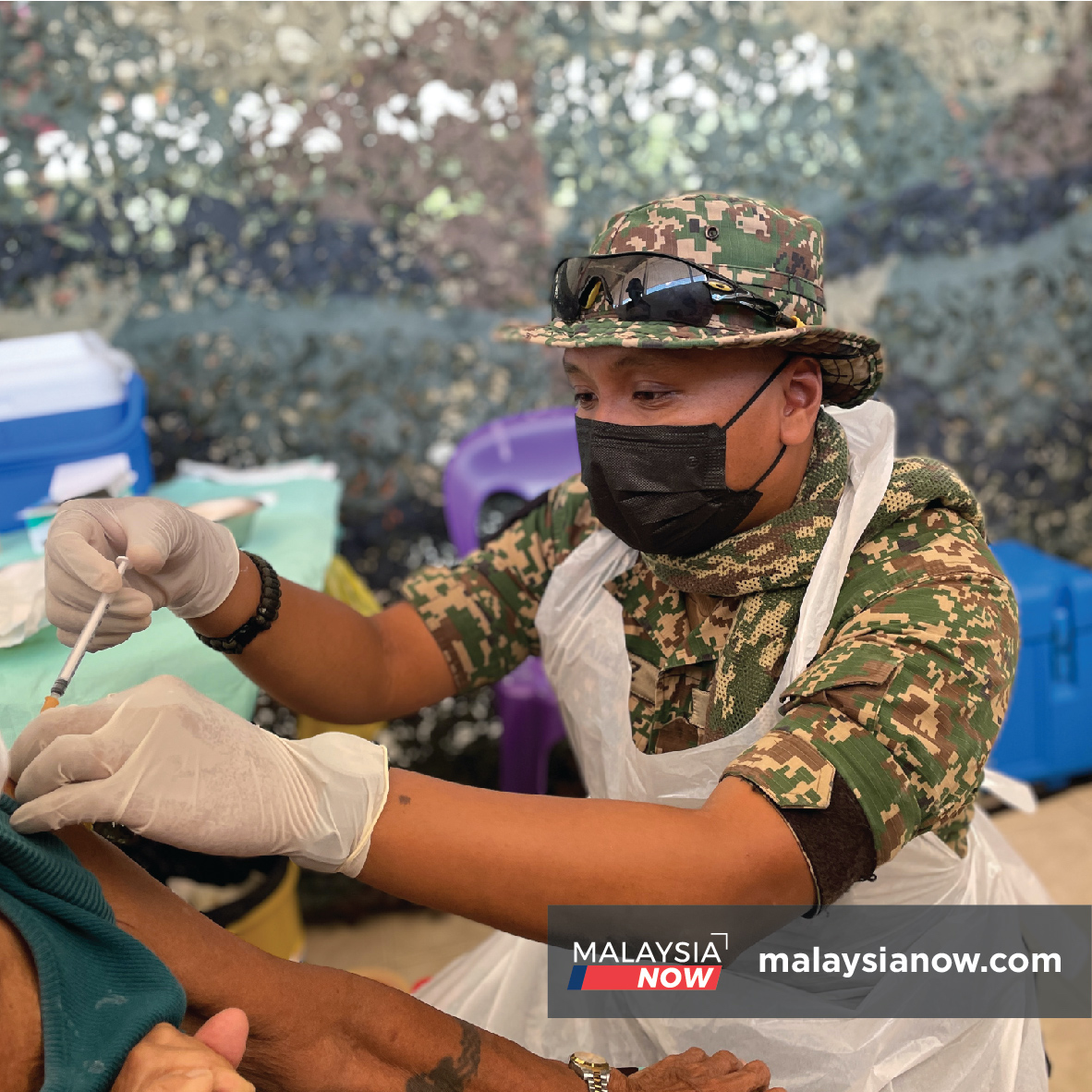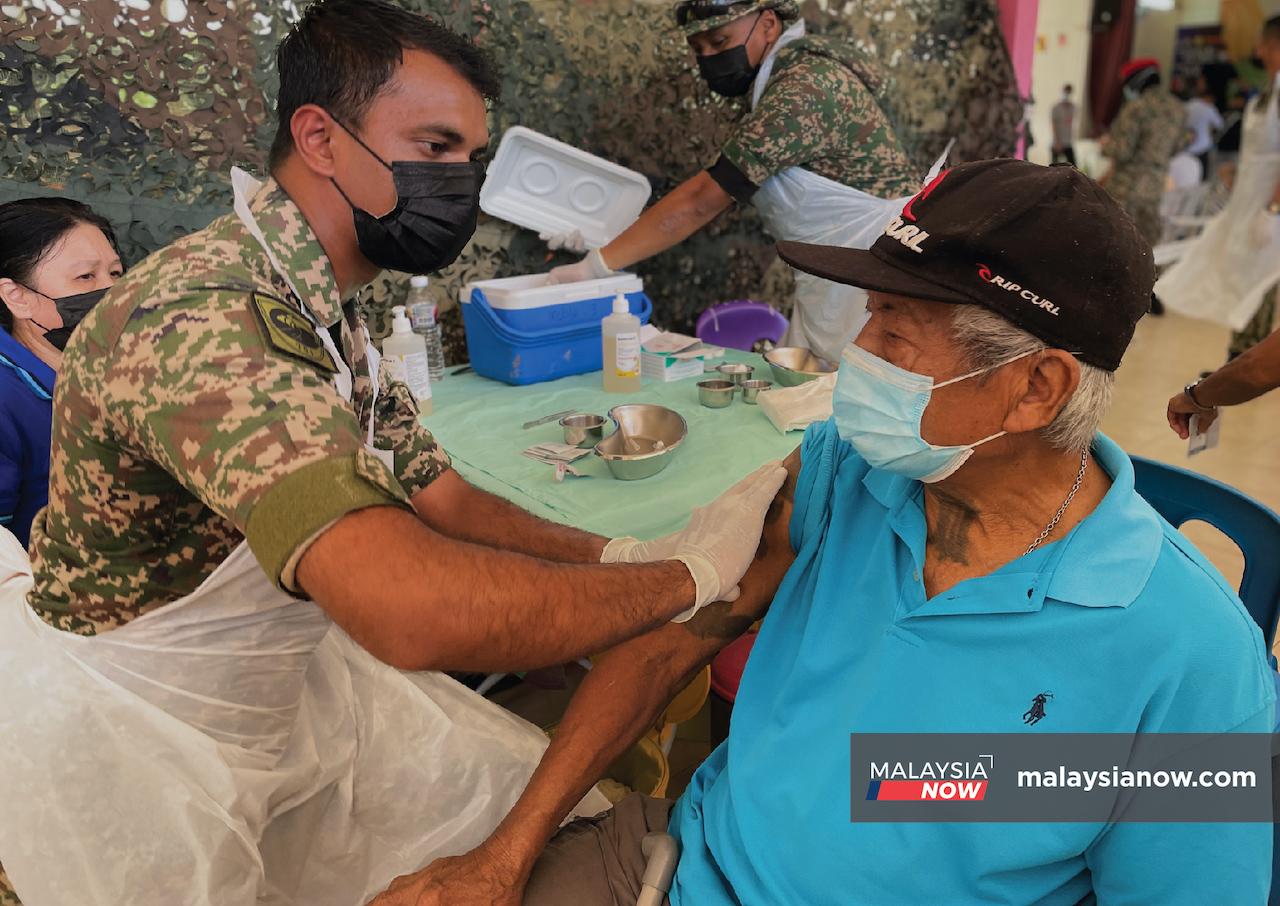Sending in the cavalry to vaccinate rural Sarawak
The army medical teams going to communities in the interior face a wide range of challenges from logistics to communication.
Like any other armed forces personnel, army medical officers Dr Ahmad Fairuz Ishak and Dr Davendran Naidu trained hard to ensure that they would be combat-ready in the event that they were needed to defend the country from enemy forces.
This year, the call came.
For two months now, they have been on the go as part of the front line in a different sort of war against an invisible foe which has been wreaking havoc across the country for the better part of two years.
As part of the Malaysian Armed Forces Combat Medic Vaccination Team (CMVT), they have been travelling to remote areas in rural Sarawak to ensure that no one is left out of the state’s vaccination drive against Covid-19.
The CMVT consists of four medical outreach teams comprising four medical officers and 16 medical battalion members from the Ninth Brigade Infantry.
Their journeys off the beaten track deep into Sarawak’s interior mean that villagers from remote settlements that lack medical facilities do not have to travel to the nearest town to get jabbed.

For the villagers, this is a huge load off their shoulders as making the trip to town would require money for transportation, food and accommodation – money that they can ill afford to spend.
But for Fairuz and Devandran, their task means many long and weary hours spent on the road – or, in rural areas, the lack thereof.
Fairuz, who holds the rank of captain, said the limited access to remote areas in the state was one of the obstacles to reaching villagers with the much needed vaccines.
Apart from the sheer size of the state, there is also the wide range of landscapes to deal with, from swamplands around the coast to riverine plains and mountain ranges covered by dense rainforests.
The army medic team spends much of its time in four-wheel drives and speedboats, especially when attempting to reach villages that are only accessible by water.
If it takes more than a day to vaccinate everyone in the village, the team must also set up camp there and stay put for as long as it takes.
There is also the challenge of transporting the vaccines across the state.
“The communities are mostly scattered along the tributaries of the river,” Fairuz told MalaysiaNow. “Their main form of transportation is by water.”

He gave the example of Long Singut in Kapit, a settlement near the Sarawak-Kalimantan border.
“To get there, you have to drive about eight hours and then travel another four hours by boat.
“Usually we travel by boat, but there were a few trips where we used a helicopter,” he said.
Then, there’s the issue of communicating with the villagers. In Sarawak, most remote settlements are home to the Iban, Kenyah, Kayan, Punan, Penan, Kajang, Lun Bawang and Kelabit, all of whom speak their own language. Not many are fluent in Malay or the Sarawak variant of it, especially the elderly.
This means that for outsiders, things can get lost in translation very quickly.
Fairuz and Davendran agreed that delivering information about the vaccines to these communities has been a major hurdle.
Davendran, a lieutenant, said the team had spent days looking for translators to help them communicate with the villagers and convince them to accept the vaccines.
Speaking to MalaysiaNow, he recalled a trip the tea made to Long Unai, which is home to the Penan Muslims.
“We had to ask the district officer to come to the village to tell them why they needed the jab.”

On their own, it was slow going persuading the villagers to roll up their sleeves, especially those among them who were older.
“Only 30 people wanted to be vaccinated at that time,” Davendran said.
“But after the district officer came and briefed them, 151 people were vaccinated.”
There is also the problem of internet access, a matter of course for those living in city areas but a luxury for residents in the interior.
In many villages, there is zero connectivity which means registering for vaccination through MySejahtera is not an option. Instead, registration must be done manually with pen and paper.
Meanwhile, those who are stateless face a host of other complications in registering for vaccination.
In Sarawak, stateless people are allowed to receive the jab provided that their status is verified by community leaders. But their lack of documentation means that many crucial details are unknown.

“Many stateless people do not know their date of birth,” Fairuz said.
He spoke of an occasion on which he had vaccinated a stateless person.
“When I asked him about his date of birth, he said he did not know when he was born. But because he had a tattoo that had numbers that looked something like a date, I just used that.
“People need to understand that stateless people are not well educated,” he added.
“They cannot read or write because they did not attend school. They don’t have the opportunity or privilege to go to school because they don’t have ICs like we do.”
But he is determined to continue doing the best he can with what little information he can glean.
“There’s no point if we don’t vaccinate them, especially those who are not privileged.
“How can we achieve herd immunity if there are people who want to be vaccinated but can’t get the jab just because of their status?”
Subscribe to our newsletter
To be updated with all the latest news and analyses daily.
